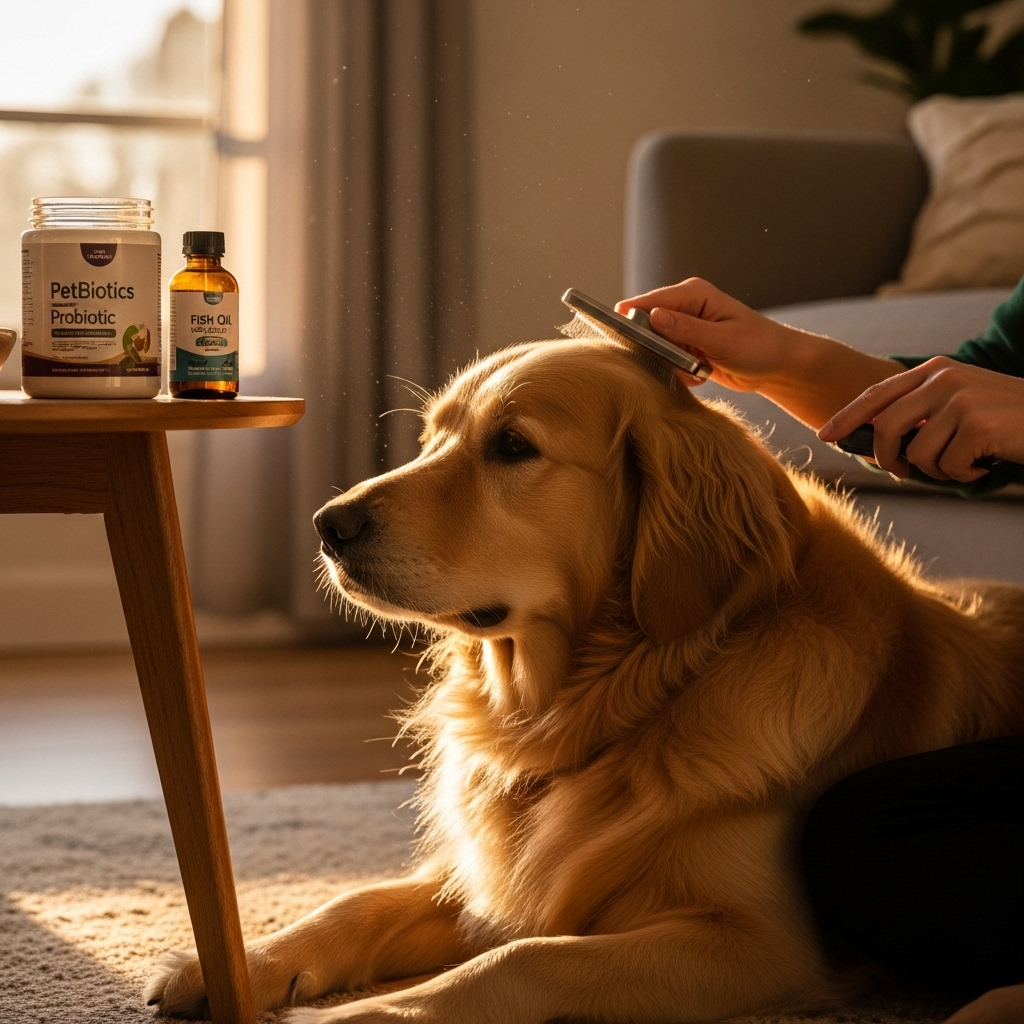Probiotics for Golden Retrievers: Gut–Skin Connection

Many Golden Retriever owners notice flaky skin, hot spots, excessive shedding or a dull coat and wonder whether probiotics can help. Probiotics — beneficial live microorganisms — are increasingly used in dogs to support digestive health, and through the gut–skin connection they may also support healthier skin and a shinier coat. This article explains how probiotics may affect skin and coat, what strains and products to consider, safety tips, and when to consult your veterinarian.
How the gut–skin connection works in dogs
The gut–skin connection describes how the intestine’s microbiome influences skin health. A balanced gut microbiome helps regulate the immune system, reduce inflammation, and support nutrient absorption — all factors that affect skin and coat condition. When gut balance is disrupted (dysbiosis), dogs can develop gastrointestinal symptoms and changes in skin appearance, including itchiness, increased shedding, or susceptibility to infections.
Key ways gut health affects skin and coat
- Immune modulation: A healthy microbiome helps the immune system respond appropriately to allergens and microbes, potentially lowering skin inflammation.
- Nutrient absorption: Improved digestion can enhance uptake of fatty acids, vitamins (A, E, B-complex) and amino acids that support skin and hair growth.
- Barrier support: Some probiotic effects may strengthen the skin barrier indirectly by reducing systemic inflammation.
Can probiotics improve a Golden Retriever’s skin and coat?
Research in veterinary medicine and clinical experience suggest probiotics can support skin health in dogs, particularly when skin problems are linked to food sensitivities, allergies, or gut imbalance. Probiotics are not a cure-all: their benefit depends on the individual dog, the underlying cause of the skin issue, the probiotic strains used, and treatment duration.
Common outcomes reported by owners or seen in studies include reduced itching, fewer flare-ups of allergic dermatitis, less dandruff, and a shinier, healthier-looking coat when probiotics are used as part of a broader approach that includes proper diet and skin care.
Which probiotic strains are commonly used for skin and coat support?
Not all probiotics are the same. Strain-specific effects matter. Some strains commonly included in canine probiotics with potential skin or immune benefits are:
- Lactobacillus acidophilus — supports gut balance and may help immune responses.
- Lactobacillus rhamnosus — studied for immune modulation and allergy-related outcomes.
- Bifidobacterium animalis and Bifidobacterium longum — support digestive health and reduce gut inflammation.
- Enterococcus faecium (SF68 or other vetted strains) — often used in dog-specific formulas for general gut support.
- Bacillus coagulans — spore-forming, stable strain sometimes used in supplements.
When choosing a product, look for formulations labeled for dogs with clearly listed strains and colony-forming units (CFUs). Dog-specific products are recommended over human probiotics unless advised by a veterinarian.
How to use probiotics safely for your Golden Retriever
- Consult your veterinarian before starting a probiotic, especially if your dog has immune disorders, is on medications, is very young, elderly, or pregnant.
- Choose a reputable brand with dog-specific dosing and clear strain information.
- Follow the manufacturer’s dosing guidelines and your vet’s advice. Typical maintenance doses vary by product and dog weight.
- Give probiotics consistently for several weeks to evaluate benefit — skin improvements may take 6–12 weeks.
- Combine probiotics with overall skin-care measures: balanced diet rich in omega-3 fatty acids, regular grooming, flea control, and treatment of any underlying infections.
What to expect and when to see improvement
Probiotics are supportive, not instant fixes. If your Golden Retriever’s skin issues are partly gut-related, you may notice:
- Gradual reduction in itchiness and inflammation over weeks.
- Decreased dandruff and fewer hot spots.
- Smoother, shinier coat after improved nutrient absorption.
If you do not see improvement after 8–12 weeks, or if symptoms worsen (increased itching, new lesions, vomiting, diarrhea), consult your veterinarian. Probiotics can be part of a multi-step plan that may include elimination diets, allergy testing, topical treatments, or medication when needed.
Pros and Cons
| Pros | Cons |
|---|---|
| Supports gut balance and immune regulation | Results vary by dog and strain; not guaranteed |
| May reduce allergy-related inflammation and promote healthier coat | Possible short-term digestive upset in some dogs (gas, soft stool) |
| Available in palatable, dog-friendly forms (powder, chews) | Quality varies between products; some lack clear strain labeling |
Practical tips for Golden Retriever owners
- Prioritize a high-quality diet with adequate omega-3 fatty acids (EPA/DHA) which directly support skin and coat.
- Use a gentle, vet-approved shampoo and avoid overwashing which can strip natural oils.
- Maintain a consistent flea, tick and parasite control plan — parasites are common causes of skin irritation.
- Record changes after starting a probiotic (date, product, symptoms) to discuss with your vet.
Short FAQ
Q: Can I give my Golden Retriever human probiotics?
A: It’s best not to give human probiotics without veterinary advice. Strains, doses and additives in human products may not be appropriate for dogs. Use a product labeled for dogs when possible.
Q: How long before I see a difference in my dog’s coat?
A: Allow at least 6–12 weeks of consistent use to evaluate changes. Skin and coat improvements are gradual as underlying gut balance and nutrient status improve.
Q: Are there any side effects?
A: Most dogs tolerate probiotics well. Some may experience mild, temporary digestive changes (gas, soft stools). If severe symptoms occur, stop the supplement and consult your vet.
Q: Can probiotics replace treatment for allergies or infections?
A: No. Probiotics are supportive and can be part of a broader management plan, but they do not replace veterinary diagnosis and treatment for allergies, bacterial or fungal infections, or hormonal issues.
Key Takeaways
- The gut–skin connection means improving gut health can support skin and coat condition in Golden Retrievers.
- Certain probiotic strains (Lactobacillus, Bifidobacterium, Enterococcus) are commonly used in dog products and may help reduce inflammation and support a healthy coat.
- Choose dog-specific, reputable products and consult your veterinarian before starting, especially for dogs with health issues.
- Combine probiotics with a balanced diet, omega-3s, good grooming and parasite control for best results.
- Expect gradual improvements; allow several weeks to assess effectiveness and report progress to your vet.
Note: Probiotics are a supportive tool, not a replacement for veterinary care. Always discuss major changes to your Golden Retriever’s health plan with your veterinarian.
Disclaimer: This article is for informational purposes only and does not replace professional veterinary advice. Individual dogs may respond differently to probiotics. Consult your veterinarian before starting any supplement, especially if your dog is pregnant, very young, elderly, has an immune disorder, or is taking prescription medications.

Leave a Reply